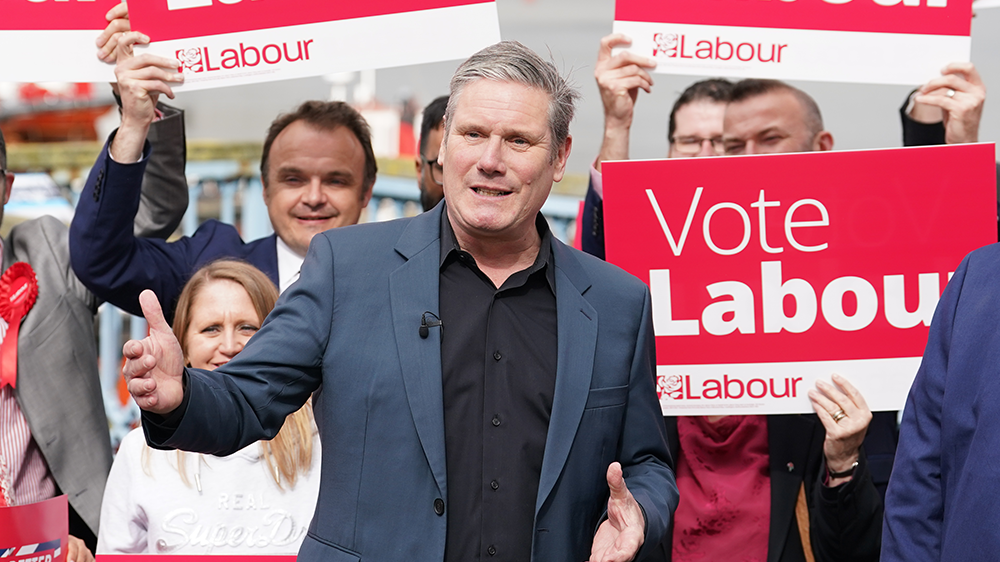Labour ‘confident but not complacent’ about a general election win as Brexit backers return to the party
Shadow health secretary Wes Streeting says Labour is ‘not even entertaining’ the prospect of a coalition with the Liberal Democrats

Labour is “confident but not complacent” that it will win a majority at the next general election, the shadow health secretary has said.
Wes Streeting said the party has made “enormous progress” since Sir Keir Starmer became its leader in 2020. The Ilford North MP said that voters who had previously “turned their backs on Labour” were “turning to Labour again”.
He also avoided discussing whether the party would go into coalition with the Liberal Democrats if it falls short of a majority at the next general election, saying confidently: “We’re not even entertaining that prospect.”
His comments came as the results of Thursday’s local elections appeared to suggest that the party is winning back swathes of pro-Brexit voters across the country. As the Tories faced a drubbing in Rishi Sunak’s first electoral test as prime minister, Labour made significant gains and is now the largest party in local government.
The party took control of key councils including Stoke-on-Trent, which was seen as a test of the Labour leader’s ability to win in areas that backed Brexit in 2016. Based on the results, Labour also expects to reclaim seats in the strongly Brexit-backing constituencies of Great Grimsby, Redditch and Burnley at the next general election.
Figures seen by The Observer showed that support for Labour rose by seven points compared with 2021 in the most heavily pro-Leave wards.
And a polling expert told The Independent that Brexit was becoming less of a factor in how people voted.
Martin Baxter, chief executive of Electoral Calculus, said: “It is not the case that Leave voters are super attracted to Labour, but they are not as repelled by Labour as they were under Jeremy Corbyn in 2019.
“In 2019, Leave voters were actively repulsed from Labour, and that effect now seems to have faded.”
He said the removal of Brexit as a driving factor could lead to a windfall at the ballot box for Labour at the next general election. Mr Baxter said: “The Conservatives won in 2019 for four reasons: the charisma of Boris Johnson, the anti-charisma of Jeremy Corbyn, getting Brexit done, and because the left-of-centre opposition parties were split.”
Of those, “three out of the four Conservative advantages have gone”, he added.
But while Mr Baxter said opposition to voting Labour has eased under Sir Keir, he added that Leave voters are not necessarily enthusiastic supporters of the party either.
Mr Streeting told the BBC’s Sunday with Laura Kuenssberg programme: “Right across England, in places where we need to win to form a majority, Labour is winning back support.
“And we are confident we can win a majority at the next election, but not complacent.”

Culture secretary Lucy Frazer insisted the Conservatives are winning back support, adding that Labour and the Liberal Democrats “did not actually do as well as the polls have suggested”. She told the BBC: “When people see us delivering, then we will regain the trust of the British people.”
Mr Baxter has previously told The Independent that there is a “narrow path to victory” for Rishi Sunak at the next election, but that as things stand, Labour is heading for “quite a big majority”.
In Thursday’s local elections, the Conservatives lost 1,064 seats – exceeding even the most pessimistic forecasts – and lost control of 49 councils.
Labour picked up 528 seats and took control of 22 councils, while the Liberal Democrats saw their best result in decades. The party picked up 407 seats and took control of 12 councils, many of which are in Tory heartlands.
Sir Keir claimed the results show Labour is on course to form a majority government at the next general election, which is expected to be held next year.
In another blow for the Tories, the Liberal Democrats are now targeting more than 20 Conservative seats in the once-safe blue wall. Key targets for the party, which is now on “general election footing”, include former Conservative Party strongholds such as Stratford-on-Avon, Windsor and Maidenhead and Surrey Heath.
Wins across the blue wall for the Liberal Democrats could see senior Conservatives including Michael Gove, Nadhim Zahawi and Theresa May ousted from their seats.
Lib Dem leader Sir Ed Davey has explicitly rejected any coalition with the Tories under Mr Sunak, but avoided ruling out a coalition deal with Labour, stressing that his party’s focus is “getting rid of Conservative MPs”.
Mr Streeting, meanwhile, challenged on the Sunday political shows, appeared several times to avoid ruling out a deal with the Liberal Democrats.






Join our commenting forum
Join thought-provoking conversations, follow other Independent readers and see their replies
Comments